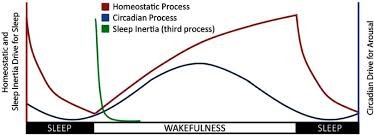Morning Brain Fog (And Tips to Tackle It)
Brain fog is something that can happen at all times of day, but many of us experience it first thing in the morning. You know the feeling: you wake up and need a good 15 - 30 minutes before you can have a full on conversation or feel truly human.
In this article, we’re exploring:
What brain fog is
What causes it
How you can prevent it
Top tips to help you feel awake and alert in the morning
What is brain fog?
Brain fog refers to the feeling of confusion, lack of focus or clarity and forgetfulness that many of us feel first thing in the morning. Some level of morning grogginess is completely normal when waking up. It’s also called sleep inertia.
Image borrowed from DovePress.
Sleep inertia?
Sleep inertia is the transition our bodies and mind goes through when moving from sleeping to wakefulness. We don’t just snap from being fast asleep to being able to perform at top-shape.
Now, the level of sleep inertia you experience can be impacted by the same things that play into brain fog. And while brain fog can happen throughout the day depending on many factors, sleep inertia is only when we wake up.
Normal sleep inertia VS morning brain fog
It’s normal to feel a little groggy for up to 1.5 hrs when you first wake up. This is why morning routines and having time to actually wake up is super important. If you jump out of bed and rush to work (and how many of us started doing that during COVID?) your first hour of work can be impacted.
But what is normal brain fog?
Normal brain fog or sleep inertia:
- have trouble focusing
- need more time to think about conversations
- be slower to move around
- to sound sleepier when speaking
Abnormal brain fog can look like:
Extreme confusion
Forgetfulness that lasts
Lack of mental clarity about yourself and things around you
Lasting effects that impact you throughout your day
If your morning brain fog begins to impact you throughout your day, you should definitely speak to your doctor and book a sleep study to see if there’s a bigger issue impacting your sleep.
But if sleep inertia and brain fog is normal, what causes abnormal symptoms?
Like most things related to sleep, extreme tiredness, stress, overwork, sleep deprivation and chaotic sleep schedules can compound brain fog. Just like sleep deprivation, and even some memory and mood swings, the best thing you can do to fix extreme brain fog is to fix your sleep.
Preventing (or reducing) brain fog
Since some level of grogginess while you transition from sleeping to being awake is normal, it’s not about fully preventing brain fog but making sure it stays at normal levels.
The best way to reduce brain fog is simple:
Sleep a full 6 - 8 hours in a row at night — consistently!
Now, this can be challenging for new parents, shift workers, doctors and nurses and many other people with jobs or lives that make it hard to sleep fully at night. But becoming sleep deprived to the point where it is impacting your ability to focus is super dangerous. And no amount of coffee is going to fix it long term.
Sleep is key.
Top tips to wake up in the morning
Aside from sleeping your full 8-or-so hours, these are our top tips to feel awake in the morning.
1. Don’t hit snooze
Snoozing can get your body back into a sleep cycle – and ultimately make you interrupt them when you finally do wake up. Waking up mid-REM can make you feel sleepy throughout the day. You may want that extra few minutes, but get out of bed when your alarm goes off and make sure to go to bed earlier that night.
2. Go to sleep on time
We all know that getting into bed doesn’t always mean we’re going to sleep. If you know you like to scroll before bed (a habit you should think about breaking) account for that in your bedtime. If you need to go to sleep at 11, get into bed at 10:30 so you still get the proper amount of sleep.
3. Set a sleep routine
Humans thrive on habit. Once your body gets into a rhythm of going to bed and waking up, you’ll fall asleep faster and wake up feeling way more rested.
4. Throw open those windows
Sunlight is a natural energizer. To make yourself feel awake when you sleep, open up your windows and get your face in some sunshine.
5. Take a shower
Morning showers are an awesome way to literally wash the sleep off you. Don’t make it too warm, and pair your shower with some energizing music to really wake up!
6. Follow all the other best practices to improve your sleep
Since extreme brain fog is caused by a lack of sleep, following all our best tips to improve sleep will make a difference. Some of our top tips include:
Getting regular exercise throughout the day
Sleeping in a cool, dark room
Reducing caffeine intake after noon
Skip the screen 3 hours before be
7. Stretch and/or meditate before bed
One of the biggest deterrents to sleep is stress (and we have no shortage of it in today’s world). Stretching or meditating before bed is an awesome way to slow down the mind and get yourself prepared for sleep. We include stretching and meditating into our bedtime routines!
Brain fog: Battle it with wellness!
Like many health challenges, brain fog can be reduced by living life with wellness in mind. Sleep properly, eat properly and move your body. And while some level of grogginess when you first wake up is normal, speak to your doctor if you find yourself struggling with intense levels of brain fog in the morning.



